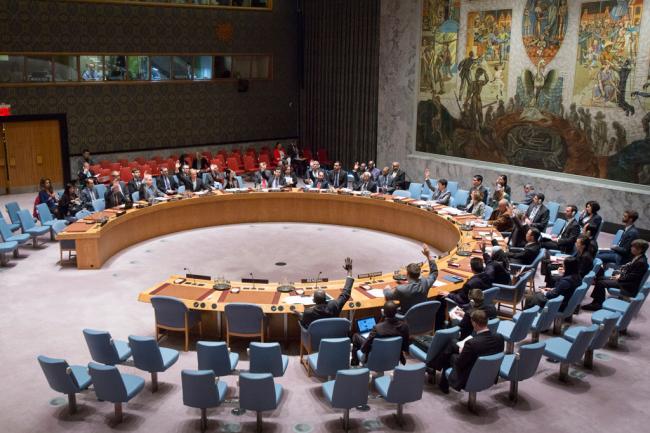
Ban welcomes ‘change in strategy and mindset’ as UN adopts landmark resolutions on peacebuilding
The resolutions expand the notion of peacebuilding to include a definition of ‘sustaining peace,’ which the documents say should be “broadly understood as a goal and a process to building a common vision of a society, ensuring that the needs of all segments of the population are taken into account.”
This encompasses activities aimed at preventing the outbreak, escalation, continuation and recurrence of conflict; addressing root causes; assisting parties to conflict to end hostilities; ensuring national reconciliation; and moving towards recovery, reconstruction and development.
Secretary-General urges UN Member States to ‘maintain the momentum’
Following the adoption of the resolutions, UN Secretary-General Ban Ki-moon congratulated Member States on the outcome of the review of the peacebuilding architecture, urging them to maintain the momentum and calling for the strengthening of international attention, assistance and funding for countries affected by conflict.
“The adoption of these comprehensive resolutions simultaneously by the General Assembly and the Security Council sends a powerful signal,” Ban said in a statement attributable to his spokesperson.
“These resolutions are a statement of intent pointing to a change in strategy and mindset. The UN system will work more strategically with governments and on the ground, in stronger partnership with others, not only to prevent the recurrence of conflict, but to prevent conflict from breaking out in the first place,” he added.
The Secretary-General is strongly committed to supporting the entire United Nations system in implementing these resolutions immediately noting that there can be no higher priority than sustaining peace, which is a prerequisite for human rights, sustainable development and all other efforts, the statement stressed.
Sustained peace is a shared task and responsibility
For their part, the resolutions emphasize that sustained peace is a shared task and responsibility that needs to be fulfilled by the Government and all other national stakeholders, and should “flow through all three pillars of the UN’s engagement at all stages of conflict.”
In that regard, the resolutions stress that the UN Peacebuilding Support Office should be “revitalized,” with the support of Secretary-General Ban Ki-moon, and that cooperation and coordination in the field through UN Country Teams and at UN Headquarters should be strengthened.
The resolutions also underline that the scale and nature of the challenge of sustaining peace can be met through close strategic and operational partnerships among national Governments, the UN and other key stakeholders, including international, regional and sub-regional organizations, international financial institutions, regional and other development banks, civil society organizations, women’s groups, youth organizations and, where relevant, the private sector.
As such, the resolutions reaffirm the role of the UN Peacebuilding Commission (PBC) in bringing a strategic approach and coherence to peacebuilding efforts. The PBC, a subsidiary body to the General Assembly and the Security Council, provides a platform for a coordinated approach to sustaining peace, involving all actors, including the countries under discussion, regional member States and organizations, international financial institutions and civil society.
The resolutions emphasize that the PBC should work more flexibly and serve a bridging role among the General Assembly, Security Council and the Economic and Social Council (ECOSOC), calling for closer coordination and cooperation between the PBC and the Council on peacebuilding issues.
The resolutions offer a range of options to the Secretary-General and the PBC for cooperation with regional and sub-regional organizations, international financial institutions and other relevant stakeholders. The resolutions particularly request the Secretary-General to explore options for strengthening UN-World Bank collaboration. It stresses the need for cooperation with regional organizations, specifically mentioning the African Union (AU).
Redefining UN peacebuilding
In a recent interview with UN Radio, the UN Assistant Secretary-General for Peacebuilding Support, Oscar Fernandez-Tarranco, noted that the resolutions “speak to the new opportunities that redefine peacebuilding 10 years after the peacebuilding architecture as we know it so far was established.”
Stressing that the resolutions are “re-framing the whole debate about what peacebuilding is on Wednesday,” he said that, for many years, peacebuilding was something that Member States and the UN organized themselves around preventing the recurrence of violence after wars.
The resolutions bring to the fore the concept that conflict prevention is “something this Organization was fundamentally established to do.”
“The core function of the UN is, first and foremost, to prevent wars, to prevent violent conflicts from actually happening,” he added.
The so-called UN peacebuilding architecture was created in 2005, at which time the Peacebuilding Commission, the Peacebuilding Support Office and the Peacebuilding Fund were established. This occurred as a response to the concern of former Secretary-General Kofi Annan that there was “a gaping hole in the United Nations institutional machinery: no part of the United Nations system effectively addresses the challenge of helping countries with the transition from war to lasting peace.”
UN Photo/Manuel Elias
Support Our Journalism
We cannot do without you.. your contribution supports unbiased journalism
IBNS is not driven by any ism- not wokeism, not racism, not skewed secularism, not hyper right-wing or left liberal ideals, nor by any hardline religious beliefs or hyper nationalism. We want to serve you good old objective news, as they are. We do not judge or preach. We let people decide for themselves. We only try to present factual and well-sourced news.







